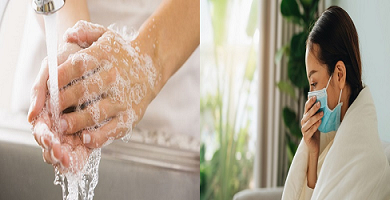FCP Medical makes sure that the readers know in detail about the causes of covid-19. If you think you are experiencing symptoms of the coronavirus, you must take precautions. If you are at home, you must isolate yourself and take great care of yourself. With the increase in the number of cases, many people have experienced this. This article will describe the measures that you can take at your home when you think you have the Coronavirus symptoms.
The Following List of measures that you can take at your home when have the Symptoms.
Self-Isolation:
If you are at home, the best thing to do is to isolate yourself from others. Family physicians in uk recommends self-isolation for the safety of your loved ones. We all are aware that by the coughing and sneezing of the infected person, the virus spread. If you are in contact with anyone, they will be exposed to the virus as well. Keep yourself in a separate room. This will keep the virus to yourself only. Do not go to any gathering or outside. If you are working, you should inform your office. Going into self-quarantine is the best way to fight this virus.
The confirmation test of covid-19 is important in making sure that you Covid or not. If your test comes with confirmation, you should immediately go into isolation. Even with the mild symptoms, doctors recommend the patients get themselves isolated in their homes. The room must have a dedicated bathroom to not share the germs. But if you don’t have this luxury, you have to make sure that it is cleaned every time you leave it. The germs can come in contact with the next person who uses it can be exposed to the infection.
Social Distancing:
If you have coronavirus symptoms, you should practice social distancing as well. Even when you have doubts about the symptoms, start taking things seriously. When visitors come to your place, don’t meet them or shale hands. You can just wave or talk on the phone. The person who is infected with the virus is the main source of the spread. When a person is coughing or sneezing, the droplets from his mouths go into the air. This infected air can easily be inhaled by the person in your surroundings. These droplets are rich in the virus. As soon as people inhale the same air, they will be infected as well. Wear a mask when you are outside the room in case of extreme necessity.
Precautions:
It is important to keep taking precautionary measures when you are self-isolating. You should be careful with what you are touching. If you are sneezing or coughing, you should use a tissue. The germs from your sneezing must not spread because they can expose others to the virus. Wash your hands frequently. Every time you wash your hands, make sure to cover all the surfaces of your hands with soap. The soap must be on your hands for at least 20 seconds. Doctors also recommend frequently use sanitizer with alcohol in it. Clean the surfaces that you are frequently touching. These surfaces usually include doorknobs, remote, and doors. Keep your item separate. Be sure that no one uses your towel, dishes, clothing, and bedding.
For Fever:
If you are experiencing a high fever which is common in Corona Virus, you should take medication for that. High temperatures are commonly observed in the coronavirus. Acetaminophen and ibuprofen can be a great help in reducing the levels of fever. You can also consult your doctor. Fever also makes the patient feel lethargic. Take as much rest as you can. It helps in getting back your energy. Fever can also cause fatigue and tiredness. Patients complain a lot about fatigue. The rest can make you feel better. Keep yourself hydrated as well. The right amount of water is necessary to keep you fresh.
For Cough:
An unusual dry cough is a common symptom of the coronavirus. For a dry cough, you should keep your throat moist. Keep your throat moist as it helps in reducing the long attacks of cough. Try taking sips of water frequently. You can also drink tea and take hot beverages. They leave a soothing effect on your throat. A common home remedy for dry cough is to drink warm water with honey. You can also take hot milk. Breathing in a steamer or humidifier also helps in getting rid of cough. Gargling with hot water also has beneficial results on the throat. You can add salt in the amount you are comfortable with.
For Shortness Of Breath:
Many people who were exposed to Coronavirus said that they faced shortness of breath. The infection affects your lungs and decreases your ability to breathe. If you are facing this issue while self-isolating, you can try slow breathing. It will help in maintaining the rhythm of your breaths. There are many meditations techniques available for calming you down. People who have anxiety should also try these to fight it. People who have a history of asthma should also use their inhalers when they are in self-quarantine. Make sure you are using your inhaler and not someone else’s.
FCP Medical is raising awareness about the Coronavirus Symptoms. If you are experiencing the symptoms when you are at home, self-isolate yourself. Do not share your space with others because you can spread the virus. Keep your items away from others. Make sure to take plenty of rest. Take medications to reduce the fever. Drink hot beverages to get rid of dry cough. Breathing techniques will help in decreasing the shortness of breath.





